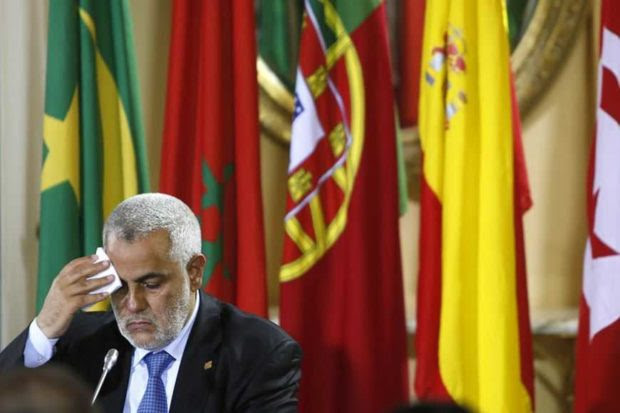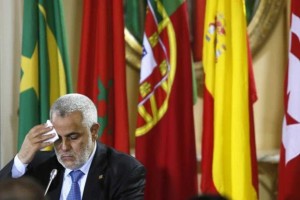Ashark Al Awsat
Abdul-Kabir Al-Minawi
Morocco’s Prime Minister Abdelilah Benkirane wipes his forehead during the closing news conference after a summit of Mediterranean neighbours at Verdala Palace outside Valletta October 6, 2012.
Leaders from France, Italy, Spain, Portugal, Libya, Mauritania, Morocco, Tunisia, Algeria and Malta are meeting in Valletta for the second 5+5 Dialogue Summit.
Marrakesh- More than 15 million Moroccan voters are expected to participate in the parliamentary election on Friday, which is the second to take place after the new constitution in 2011 and the fourth under the rule of Mohammed VI of Morocco.
The regulatory law of the elections says that 395 members of the parliament should be elected directly.
– The primary data issued by the Moroccan Minister of Interior showed that electoral lists have reached 1400, that include around 7000 candidates; only three parties have covered all election areas: The Democratic Independence Party (Istiqlal party), Moroccan Authenticity and Modernity Party (Al-Asala wa Al-Mu’asara Party), and the Justice and Development Party (PJD).
According to some analysts, the upcoming elections will be held amid sharp political tension, conflict, and struggle among all the parties and the state institutions.
Observers see that election on the 7th of October is a matter of death or survival as per the two main parties in Morocco which are The Justice and Development (Islamic reference) and the Al-Asala wa Al-Mu’asara (secular).
Al-Hussein A’boushi, professor of constitutional law and political science at University Cadi Ayyad, Marrakech told Asharq Al-Awsat that the current political scene in the country can be read through many factors including: the 2011 social activities, the increase of democratic demands, the royal speech and the March 2011 constitution altered the situation and allowed many political forces like the PJD to appear. Not to mention, the retreat of the national communist parties and the ascension of the Islamic ones.
A’boushi says that the government leadership by an Islamic party led to the emergence of new forms of conflicts in Morocco. These conflicts will definitely affect the upcoming elections and prevent one, two, or even three parties from controlling parliamentary majorities that allow them to form a government in the future.
The professor noted that the sharpness of the political discussion has sometimes reached verbal violence in the political speech among the influential politicians during the elections’ phase; the Minister of Justice who belongs to the PJD and the Minister of Interior have moved their verbal clashes concerning elections to the social media.
Idris Lashkar, secretary-general of the Socialist Union of Popular Forces (USFP) said the dispute express the lack of homogeneity in the government and criticized them for communicating through social media websites instead of discussing their differences in a meeting.
In fact, the authorization of an “unknown protest”, during which participants called Prime Minister Abdelilah Benkirane to resign days before elections, was not the main reason of conflict between the PJD and the Ministry of Interior. The conflict began when the ministry banned the Salafi turned-politician Hammad Kabbaj from the candidacy for the elections, which provoked a remarkable debate among different opinions.
It is worth mentioning that Benkirane denounced the ban of Kabbaj, describing him as a patriotic, open-minded Salafi. The Prime Minister has also promised to maintain reform if his party wins another round in the parliament and stressed on the importance of stability in the country.
Unlike the Justice and Development Party that insisted on maintaining reform, Moroccan Authenticity and Modernity Party has called for instant change and pledged to adopt new procedures and measures like raising the growth rate, reducing debts, increasing investments, creating job opportunities, digitization of administrations and fighting corruption.
Elias al-Amari, deputy secretary-general of the Moroccan Authenticity and Modernity Party considered that no ally can be set with the PJD, because they belong to two different social projects.
Amid this sharp conflict between the PJD and the Authenticity and Modernity Party, other political parties refuse to leave the electoral competition for them.
*A third option
In the same context, many are speaking about a “third movement”, which is mainly represented by the federalization of the democratic left-wing seeking to create a political trend that opposes both PJD and Authenticity and Modernity parties.
Nabila Mounib, Secretary-General of the United Socialist Party has seen that the two rival parties cannot respond to the Moroccans ambitions by enhancing a real democracy. She also considered that her party suggests a real political reform based on separation among different authorities.
Finally, A’boushi sees that Moroccan officials have forecasted a participation rate in the elections over 50%. But many observers suggest that regardless of results, the composition of a harmonized government will be so difficult amid all the ongoing conflicts between parties.








